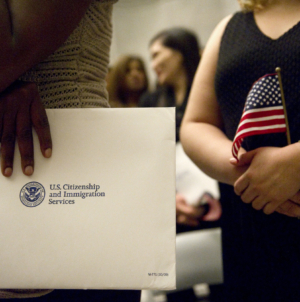-
US Immigration Backlog Hits All-Time High - 24 mins ago
-
South Korea Holds Its Chin Up as Trump Wields Tariff Threat - 25 mins ago
-
Couple Order ‘Non-Alcoholic’ Wine at Restaurant in Europe—Doesn’t Go Well - about 1 hour ago
-
5 Israeli Soldiers Killed in Gaza, Military Says - about 1 hour ago
-
Donald Trump Sending More Weapons to Ukraine: What We Know - 2 hours ago
-
What to Know About P.O.W.s in Myanmar’s Brutal Civil War - 2 hours ago
-
South Africa Reacts to Trump Tariffs News - 2 hours ago
-
The Brothers Who Came Face to Face in Myanmar’s War - 3 hours ago
-
Club World Cup Futures Odds, Best Bets: PSG Favorites Entering Semifinals - 3 hours ago
-
Caleb Williams Is Already Better Than $55 Million QB, Says NFL Analyst - 3 hours ago
Democrats Have Become a Party Without a Soul. Is Their Day Done? | Opinion
Like the seasons, political parties come and go. In 1847, Abraham Lincoln was elected to Congress as a Whig. By 1854 that party had ceased to exist. The Liberal Party dominated British politics during much of the 19th and early 20th centuries with prime ministers like William Gladstone and David Lloyd George. Yet after 1922 it never held power again. Both the Whigs and the Liberals were undermined by a failure to recognize shifting public sentiment, internal division, and the rise of a transformative opposition. The re-election of President Donald Trump has thrust the Democratic Party into a similar crisis in which party factionalism, a loss of voter trust, and the rise of the MAGA movement all suggest that they are the next Whigs.
The Whig party was founded in 1834 principally to oppose Andrew Jackson. It supported protective tariffs, a central bank and federally funded infrastructure development. Prominent Whigs included presidents William Henry Harrison, John Tyler, Zachary Taylor and John Quincy Adams as well as Henry Clay and Daniel Webster. Yet the party divided and eventually dissolved over the issue of slavery with the “Cotton Whigs” joining the Democrats and the northern “Conscience Whigs” like Lincoln joining the new Republican Party. The first Republican presidential candidate, John C. Freemont, called the Whigs a “party without a soul”.
In 2025, there is no single issue like slavery dividing America, and that makes the demise of Britain’s Liberal Party a better analogy for today’s Democrats. The largely middle-class Liberals replaced Britain’s aristocratic Whigs in the 19th century only to be supplanted themselves by the working-class Labor Party in the 20th century. While the Liberals’ collapse was accelerated by internal division, it was primarily their economic, social and foreign policy agenda that brought the party down. Democrats face a similar set of problems.

Anna Moneymaker/Getty Images
Economics usually comes first in voters’ minds and so it was in early 20th century Britain. Inflation was rising faster than wages, capital was flowing overseas, and manufacturing was in decline. British workers abandoned the free market Liberals for a party that felt their pain and was prepared to do something about it. Sound familiar?
For many years the American worker was an orphan abandoned by both the left and right. Trade policy supported by both parties shipped jobs overseas creating profits on Wall Street and shuttered stores on Main Street. Illegal immigrants flooded the labor market competing with America’s poorest citizens. Environmental activism raised the cost of energy, which in turn raised the cost of just about everything. Here again, rising energy costs were felt more keenly by wage earners than stockbrokers because buying gasoline and heating their homes constitutes a much larger percentage of their take-home pay.
For their own reasons neither the Democrats nor the Legacy Republicans of Mitch McConnell and Paul Ryan cared much about the plight of American workers. Neither party did much to reverse America’s de-industrialization which they claimed was inevitable. Democrats welcomed illegal immigrants who they expected would vote for them while Republicans welcomed cheap labor they hoped would boost corporate profits. Nobody asked if there might actually be benefits to climate change. In addressing the plight of the American worker Democrats have now been outflanked by what some call the “Trump-Labor Party,” just as the Britain’s Liberals were replaced by the Labor Party.
This abandonment of the American worker created a problem for Democrats and an opportunity for Republicans. While the Democrats had long been an awkward mix of blue-collar workers, ethnic minorities and urban liberals the Republicans had never depended on these voters. Now MAGA Republicans began to openly call for re-industrialization through tariffs, an end to illegal immigration and a reversal of costly restrictions on energy production. At the same time more and more citizens began voting along economic rather than ethnic lines. The result has been one of the most dramatic shifts in our political landscape since the Civil War. One that saw Trump elected twice.
Social issues are also important. Britain’s Liberals were slow to recognize the growing momentum of the women’s suffrage movement and progressive Democrats have overplayed their hand on race and gender. Most Americans believe the content of your character matters more than color of your skin and do not want a Supreme Court justice selection explicitly restricted to a black woman. Most Americans do not want biological males playing soccer against their daughters and yet Senate Democrats have blocked efforts to prevent that from happening. Democrats also continue to promote the idea of sanctuary states for transgender minors and allowing treatment without their parents explicit say so. All of this is costing Democrats support among socially conservative voters.
Foreign policy played a secondary, but still important, role in the demise of the Liberal Party when the question of home rule for Ireland led Ulster Unionists to feel betrayed. Today many Americans feel betrayed by Washington’s globalist elite. They do not want to be the planet’s policeman and resent defending a global order they believe is built on defense spending imbalances and unfair trade practices. They want a president who puts America, not the United Nations, first.
More specifically, the harsh criticism of Israel by Democratic and Democratic-leaning congress members, including Sen. Bernie Sanders (I-VT) and representatives Ilhan Omar (D-MN) and Rashida Tlaib (D-MI), has caused some Jewish voters to switch their allegiance to a Republican party that has become ever more vigorous in its support for the Jewish homeland. Many Americans want the war in Ukraine to end and cannot understand why Democrats and some Legacy Republicans seek to continue funding this bloodbath. Above all, many, if not most, voters find it difficult to accept that deporting gangsters who are in the country illegally is somehow controversial.
The policy and ideological problems the Democrats have created for themselves are compounded by structural issues they cannot control. Their party has no unifying national leader. Republicans already control the majority of state legislators and governorships. As more and more Americans move to Red states like Texas and Florida, Republicans expect to increase their representation in Congress at the expense of deep blue states like California, and New York. Across the nation more and more Hispanic—and to some extent Black voters—are switching allegiance the Republicans.
To be clear, past Democratic administrations have a proud record of achievement having brought the nation advances ranging from rural electrification and social security to landmark civil rights legislation. Unfortunately, the questions answered by Franklin Roosevelt and
John Kennedy are not the questions being asked today. Today’s Democratic party is dominated by self-righteous, upper-middle class, coastal elites—people wealthy enough to avoid sending their children to failing public schools and able to overlook the true costs of their green agenda. The party’s ideological intolerance makes it look like little more than a power grabbing vehicle for divisive gender and race activists.
These internal divisions and shifts in support among the Democratic Party’s core constituencies such as blue-collar workers, Hispanics, Blacks, Jews, Catholics who oppose abortion, and even some suburban soccer moms who don’t want boys in their daughters’ locker room all deserve to be taken seriously. America needs a two-party political system, but if Democrats do not change course, we may not have one much longer.
David H. Rundell is a former chief of mission at the American Embassy in Saudi Arabia and the author of Vision or Mirage, Saudi Arabia at the Crossroads. Ambassador Michael Gfoeller is a former political advisor to the U.S. Central Command and a member of the Council on Foreign Relations.
The views expressed in this article are the writers’ own.
Source link



















